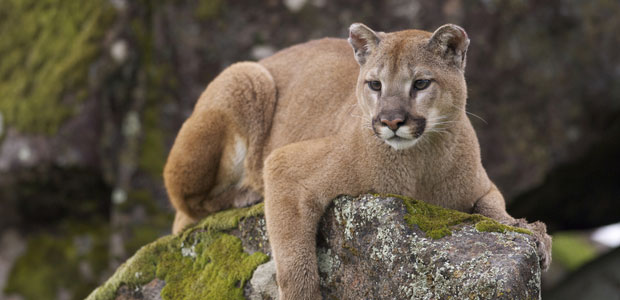Advertisement
Wildlife Wednesday: Mountain Lion
This Wildlife Wednesday, learn about the mountain lion (or puma, cougar, or catamount, depending on where you’re from). Habitat: various habitats throughout North and South America, including forests, mountains, and swamps (in fact, they are the most widely distributed wild cat in the world, which is why they have so many names) Mountain lion trivia … Continued

This Wildlife Wednesday, learn about the mountain lion (or puma, cougar, or catamount, depending on where you’re from).
Habitat: various habitats throughout North and South America, including forests, mountains, and swamps (in fact, they are the most widely distributed wild cat in the world, which is why they have so many names)
Mountain lion trivia
- Mountain lions typically weigh about 135 pounds. They hunt by stalking their prey and eventually pouncing. They’ll eat anything from deer and coyotes to rabbits, squirrels, and even livestock.
- Along with being good at stalking their prey, mountain lions are excellent climbers, runners, and jumpers. Plus, this is one cat that doesn’t mind water—they’re also excellent swimmers.
- Mountain lions are creatures of stealth and secret. It’s very rare for a human to have a mountain lion spotting (even though they may spot you!).
- Folklore maintains that mountain lions attack humans, but according to National Geographic, “statistics show that, on average, there are only four attacks and one human fatality each year in all of the U.S. and Canada.” The vast majority of attacks are on solitary people, so always be sure to exercise caution when in mountain lion territory, follow local safety advice, practise standard forest safety, and travel in groups when walking or hiking.
Why they’re threatened and what you can do to help
Because of mountain lions’ tendency to hunt livestock, farmers, ranchers, and other hunters nearly wiped out the mountain lion population by the 20th century. Today, some areas have stable populations (such as Canada’s west coast) but many others are still struggling. Currently, they are classified as endangered.
Mountain lions also require a lot of space to allow each animal sufficient hunting territory, so habitat destruction (such as roadway construction) poses a serious threat to them.
You can help mountain lions by supporting conservation efforts in your area or by checking out the World Wildlife Fund for more information (they even offer a symbolic adoption option).





